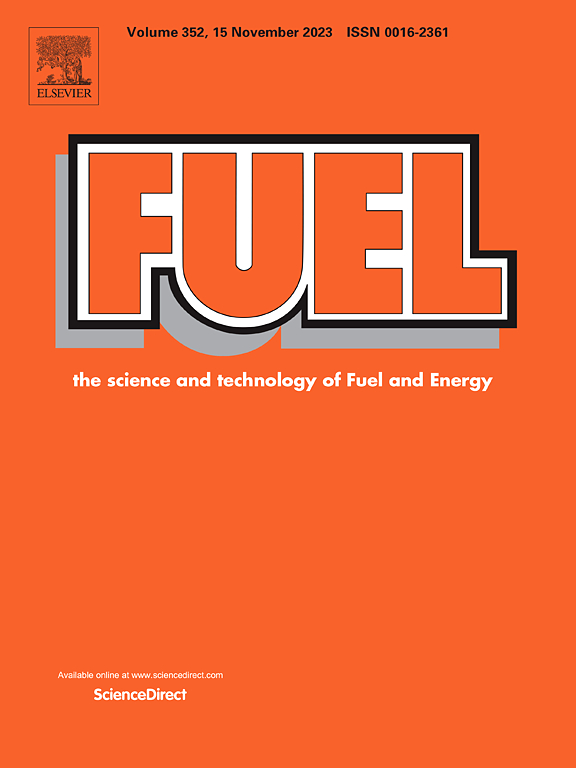A coupled thermo-hydro-bio-chemical model for underground hydrogen storage in aquifers: new insights into biochemical effects
IF 7.5
1区 工程技术
Q2 ENERGY & FUELS
引用次数: 0
Abstract
Underground hydrogen storage in aquifers (UHSA) is a promising approach for large-scale, cyclical hydrogen storage. However, indigenous hydrogenotrophic microorganisms may utilize hydrogen for biochemical reactions, potentially causing issues such as pore clogging and hydrogen loss. These microbial activities are further influenced by multi-physical fields such as fluid flow and temperature. In this study, we developed a coupled thermo-hydro-bio-chemical model for UHSA. Numerical simulation of a base-case scenario was conducted to investigate the spatiotemporal distribution of microorganisms, evolution of reservoir porosity, and hydrogen recovery performance. In addition, we analyzed the impact of various hydrogen injection strategies on biochemical effects. Our results indicate that microbial populations generally exhibit a growth-then-decay trend, and convective flow during the production stage can reduce microbial concentrations. Injecting low-temperature hydrogen helps suppress the formation of high-density microbial communities. Microorganisms are accumulated in the low-temperature zone during the production stage, resulting in substantial microbial decay which is favorable for hydrogen storage. Porosity evolution during the hydrogen storage process is primarily governed by microbial adsorption in the early stage and by mineral dissolution and precipitation in the later stage, showing a slight increase followed by a decrease. Nonetheless, the overall variation in porosity is negligible, exerting minimal influence on the flow behavior. Biogeochemical reactions lead to a 9.53% hydrogen loss and a 5% reduction in recovery efficiency. Compared to other injection strategies, slow and pulsed hydrogen injection induces a weaker microbial response. These findings enhance understanding of the biochemical impacts in UHSA and provide technical insights for practical applications.
地下蓄水层储氢的热-水-生化耦合模型:对生化效应的新认识
地下蓄水层储氢(UHSA)是一种很有前途的大规模、周期性储氢方法。然而,本地产氢营养微生物可能利用氢进行生化反应,潜在地引起孔隙堵塞和氢损失等问题。这些微生物活动进一步受到流体流动和温度等多物理场的影响。在本研究中,我们建立了UHSA的热-水-生化耦合模型。通过基本情景的数值模拟,研究了微生物的时空分布、储层孔隙度的演化和氢气的采收率。此外,我们还分析了不同的注氢策略对生化效应的影响。结果表明,微生物种群总体呈现先生长后衰减的趋势,生产阶段的对流流动可以降低微生物浓度。注入低温氢气有助于抑制高密度微生物群落的形成。在生产阶段,微生物在低温区积累,导致大量微生物腐烂,有利于储氢。储氢过程中孔隙度的演化主要受早期微生物吸附和后期矿物溶解沉淀的影响,呈现先增后减的趋势。尽管如此,孔隙度的总体变化可以忽略不计,对流动行为的影响微乎其微。生物地球化学反应导致氢损失9.53%,回收效率降低5%。与其他注射策略相比,缓慢和脉冲氢注射诱导的微生物反应较弱。这些发现增强了对UHSA生化影响的理解,并为实际应用提供了技术见解。
本文章由计算机程序翻译,如有差异,请以英文原文为准。
求助全文
约1分钟内获得全文
求助全文
来源期刊

Fuel
工程技术-工程:化工
CiteScore
12.80
自引率
20.30%
发文量
3506
审稿时长
64 days
期刊介绍:
The exploration of energy sources remains a critical matter of study. For the past nine decades, fuel has consistently held the forefront in primary research efforts within the field of energy science. This area of investigation encompasses a wide range of subjects, with a particular emphasis on emerging concerns like environmental factors and pollution.
 求助内容:
求助内容: 应助结果提醒方式:
应助结果提醒方式:


